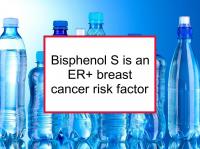Bisphenol A (BPA) is an industrial chemical commonly found in food packaging and containers, from which it leaches during normal usage. BPA is one of the highest-volume chemicals produced worldwide. Even low-dose exposure to BPA appears to have developmental effects on hormone-responsive organs, including the breast.
BPA has been linked to molecular changes that increase breast cancer risk in numerous studies. BPA has been shown to promote mammary tumor development in animal models of breast cancer. Prenatal exposure of mice to relatively low levels of BPA alters mammary gland development in ways that increase the likelihood of subsequent tumor development. BPA can also reduce the effectiveness of tamoxifen and some types of chemotherapy.
Bisphenol-S (BPS) is now used as a bisphenol-A substitute and has been described as safer than BPA. However, recent research suggests BPS and other BPA analogs (2,4’-bisphenol A, bisphenol AF, bisphenol AP, bisphenol B, bisphenol F, and bisphenol Z) have effects similar to, and are likely to be just as harmful, as BPA.
BPS exposure
As noted above, BPS is now starting to be used instead of BPA, including in plastic products labelled "BPA-free." For example, BPS is used in thermal grocery receipts, epoxy coated cans, and plastic bottles. However, recent research suggests that BPS has harmful effects similar to that of BPA. Now a new study has reported that BPS alters gene expression in ER+/PR+ breast cancer cells in ways that promote increased proliferation, migration and invasion of the cells.
Latest research links BPS to BC development & progression
The study referenced above was designed to investigate the nature of possible epigenetic changes caused by BPS in ER+/PR+ MCF-7 breast cancer cells. Epigenetic changes are modifications in gene expression caused by potentially reversible modifications in gene expression such as changes in DNA methylation and microRNAs.
In other words, epigenetic changes are chemical modifications that turn our genes off or on without modifying the DNA sequence. These changes are common and can be induced by dietary and environmental factors. BPA alternatives such as BPS are very similar to BPA, which raises the concern that they might have comparable biological effects. In fact, like BPA, BPS has been found to have endocrine-disrupting effects.
Epigenetic mechanisms have been reported to be involved in BPA-related effects in both cell and animal models. In the current study, the authors examined for the first time whether BPS induces significant epigenetic effects in ER+/PR+ breast cancer cells. It was found that BPS could in fact change DNA methylation in ways that promoted breast cancer progression, including metastasis. Gene expression profiling found BPS-related DNA methylation changes in the breast cancer promotion-related genes CDH1, SFN, and TNFRSF10C, demonstrating that BPS might play a role in breast cancer development.
Gene expression profiling also found BPS-related DNA methylation changes in some genes related to breast cancer progression, including THBS4, PPARGC1A, CREB5, and COL5A3. Further analysis of the differentially expressed genes uncovered significant potentially harmful alterations in the PI3K-Akt signaling pathway and extracellular matrix, which are related to increased proliferation, migration and invasion of the cells. The authors conclude that BPS exposure might contribute to the breast cancer progression.
Please see our article on BPA for more information.
